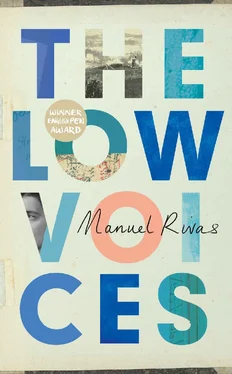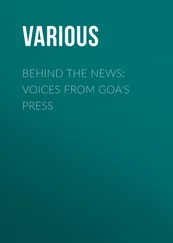Manuel Rivas - The Low Voices
Здесь есть возможность читать онлайн «Manuel Rivas - The Low Voices» весь текст электронной книги совершенно бесплатно (целиком полную версию без сокращений). В некоторых случаях можно слушать аудио, скачать через торрент в формате fb2 и присутствует краткое содержание. Год выпуска: 2016, Издательство: Harvill Secker, Жанр: Современная проза, на английском языке. Описание произведения, (предисловие) а так же отзывы посетителей доступны на портале библиотеки ЛибКат.
- Название:The Low Voices
- Автор:
- Издательство:Harvill Secker
- Жанр:
- Год:2016
- ISBN:нет данных
- Рейтинг книги:5 / 5. Голосов: 1
-
Избранное:Добавить в избранное
- Отзывы:
-
Ваша оценка:
- 100
- 1
- 2
- 3
- 4
- 5
The Low Voices: краткое содержание, описание и аннотация
Предлагаем к чтению аннотацию, описание, краткое содержание или предисловие (зависит от того, что написал сам автор книги «The Low Voices»). Если вы не нашли необходимую информацию о книге — напишите в комментариях, мы постараемся отыскать её.
A brilliant coming-of-age novel from one of Spain’s greatest storytellers,
is a humorous and philosophical take on memory, belonging, and the nature of storytelling itself.
The Low Voices — читать онлайн бесплатно полную книгу (весь текст) целиком
Ниже представлен текст книги, разбитый по страницам. Система сохранения места последней прочитанной страницы, позволяет с удобством читать онлайн бесплатно книгу «The Low Voices», без необходимости каждый раз заново искать на чём Вы остановились. Поставьте закладку, и сможете в любой момент перейти на страницу, на которой закончили чтение.
Интервал:
Закладка:
The correspondent was congratulated. And I carried on waiting for further messages from the outer system.
21. A Normal Person
THE DEADLINE. THE deadline was sacred. If we were late closing, we would miss the connections. The connections were the crucial points in the newspaper’s distribution. A dense network of strategic crossroads on the map of Galicia. In cities, it was easy to make up for a delay. But the war was being waged in towns and villages, in a territory with the most widely dispersed population in Europe. It was here, at the connection points, where our own vans passed the baton to coaches and all kinds of vehicles — some private — that completed the route. You had to be there at the agreed time. Being late was not an excuse. Mist, rain, snow, gales, formed part of normality. It wasn’t a convincing argument for a driver to attribute missing a connection to the Great Flood. There was always a way through.
‘A connection has been missed in Ortigueira!’
Missing a connection was a real drama in the life of a newspaper. A defeat. A mournful statistic. Because there was a struggle back then, copy by copy, to defend or even take small positions. Large maps of Galicia hung on the walls, some of them in relief, inhabited by a dense mass of coloured pins. In red, the points where the real battle was taking place: the critical connections.
One night, in the editorial office, things got complicated. By the time I realised, there was no one to give me a lift. I had no money for a taxi. The weather was bad. The house in Castro was a long way to go walking through the storm. It was a shame I hadn’t gone with Toño. One Friday, leaving the office, he had invited me along. His parents had a bar, Dos Ciudades, on the border between the Old City and the Fish Market. They lived on a floor of the same building. A small floor occupied by beds. Toño had five sisters. And there were the five girls, laughing amongst themselves, laughing at me. ‘But he’s just a baby! He looks as if he’s just come out of a seminary!’ How nice, what a lovely surprise, how dizzy it made me feel, to hear so much laughter and to be laughed at. I swore I would return. But not on this occasion.
So I hid in the office. Slept in a phone booth, lying on paper, covered in a jacket. The telephone was up above me, high, mute, taciturn, alert. What would I do if it rang? What if it was the news of the year and I was the only one there, in the right place, at the right time? I still hadn’t worked out whether I would answer or not when I fell asleep. On top of the papers. I was a real journalist now. I was woken in the morning by the singing of the cleaning lady. Without being seen, I went to the toilet and then sat down at a desk, pretending to have something urgent to do. Everything was fine until the deputy director, Juan Molina, turned up and was met by the head of administration. I should say the ‘all-powerful boss’, as teletypes referred to the union leader Jimmy Hoffa. He was furious. Something terrible had happened. I listened in. My heart thumping away. What terrible thing could have happened? I wasn’t the culprit, but, whatever it was, I could be a suspect.
‘We missed a connection in Pontedeume!’ said the thundering voice.
‘We closed on time,’ replied Molina in a low voice.
‘Well, close before time!’
I breathed a sigh of relief. But that day I thought someone should write an underground history of journalism. That talked about exile and censorship, yes. But with a chapter devoted to connections and the men and women in delivery. There was so much pressure I would sometimes envisage writing an article that paid tribute to the heroes of distribution. ‘In the history of western media, there is nothing like the extraordinary network set up for the distribution of newspapers in Galicia. Not even the legendary Pony Express reached such a level of precision and efficiency in its connections.’
In life, you should never miss your connections.
There’s another lesson my university teachers never taught me, and I never heard at conferences or read in books by media experts. The importance of obituaries for printed newspapers. In particular, the paid kind: funeral notices. As far as I’m aware, nobody has ever published a funeral notice on the Internet. At the Ideal , as at every newspaper, the editorial deadline was sacred. The pressure from the all-powerful administration was very strong, owing to the dramatic war waged over connections. But at night, at the critical moment, it was the manager of the printing press who had the last word. During the day, a serious, polite man, something that is generally said about those who maintain an intimidating silence. The manager’s humour and features would gradually change as the deadline approached, foreshadowing the moment when this silent man would turn into a ruthless foreman.
If memory lets go and descends the stairs from the editorial office to the printing room, it will no longer be able to deal with anything other than the fresh aroma coming from cast words. The letters — what was written upstairs, truths and lies galloping over the keys — are now leaden. This is one of my madeleines. The way the words smelled of lead. Or, to be more precise, the way they smelled of lead and milk. Because there were the linotypists, sitting in front of the large machines, sculpting out language, each with a bottle of milk at their side. Because words, even true ones, intoxicate bodies. Whenever I could, I would go down there, sometimes to collect the first copies from the rotary machine, when the ink would smudge and tattoo headlines onto your hands. I would go down there because, for me, the real smell of a newspaper, apart from the smoke of typewriter tobacco, was a mixture of lead, milk and ink down in the printing room.
Yes, a time came when all authority was vested in the manager of the printing press, and there was only one thing that could stop the frenetic process that led to the rotary machine starting up: a funeral notice. For as long as possible, someone would remain on call in administration to hire out these funereal spaces that were charged by module, by surface area, at a higher rate than commercial publicity. With a procedure that was non-negotiable. You had to pay up front. This was the first time I heard the expression ‘pay in cash’.
‘Funeral notices are paid for in cash!’
This may have served to underline their essential nature. There was no arguing over stuff that was paid for in cash. Nobody ever discussed the contents of a funeral notice. Or the price. The paper could wait for a while if somebody called the hotline to say they were on their way because of an unexpected death.
At the time, there was some speculation over the demise of local and regional newspapers. The difficulties such papers would have to survive. Taking part in a European survey, the writer Álvaro Cunqueiro, who was director of the Faro de Vigo , was the only one, together with the director of Sud-Ouest , to question this catastrophic vision: ‘I don’t know what will happen to other newspapers, but the Faro de Vigo — with classified ads in the bows and funeral notices in the stern — is a ship that will never sink.’ And the truth is they are still sailing. Sud-Ouest with its equivalent: the avis d’obsèques . Death in Galicia, when it comes down to it, is still advertised on paper and paid for in cash. The deceased don’t trust virtual reality.
I hadn’t realised the importance of death notices or those unwritten rules in the functioning of a newspaper until the case of my interview with Luís Seoane. My own, very private case. The first time I experienced with real anxiety the existence or non-existence of a text. Seoane was not just a great artist. He had been an essential reference point during the Galician exile and continued to play that role in the intellectual resistance to Franco. He had a house in Buenos Aires, but had started travelling to Galicia and Spain more frequently after setting up a new ceramics factory in Sargadelos, together with Isaac Díaz Pardo. This duo also had plans to found a newspaper, Galicia , that would recover and renew enlightened, democratic, autonomist ideals crushed by Franco’s regime. So Luís Seoane was in A Coruña, inaugurating an exhibition at a new gallery. I had just started as an apprentice at the Ideal , a publication with a history that ruffled feathers in newspaper libraries, the official spokesperson for the most intransigent brand of National Catholicism. But things were changing quickly. An internal revolution had enraged the board of directors, the National Association of Catholic Propagandists. I proposed an interview with Luís Seoane. Finally, as dusk fell, Gabriel Plaza, editor-in-chief, gave me the green light. Seoane himself was taken aback by this appearance. He knew nothing about me, obviously. But he knew a lot about the Ideal , a paper that was widely associated with ignorance or war. He agreed to talk, but was on the defensive to begin with. This may have made the interview more difficult for me, but also more interesting. Thinking about Keats’s poem, I asked him about the place today of truth and beauty, and he replied in a flash, ‘Beauty can also be terrible.’ It was drizzling when I left, and the flagstones in Cantóns glowed with the reflection of banking neon. I ran all the way to the editorial office. It was almost empty. I wrote without looking at my notes, obeying the unconfessable maxim of journalism that says, ‘If you forget, invent. And you’ll be right!’ If you invent well, that is. The manager of the printing press appeared upstairs, following the trail of that somnambulant typing. I was almost unknown to him. Before he could speak, I shouted out with anxious fervour:
Читать дальшеИнтервал:
Закладка:
Похожие книги на «The Low Voices»
Представляем Вашему вниманию похожие книги на «The Low Voices» списком для выбора. Мы отобрали схожую по названию и смыслу литературу в надежде предоставить читателям больше вариантов отыскать новые, интересные, ещё непрочитанные произведения.
Обсуждение, отзывы о книге «The Low Voices» и просто собственные мнения читателей. Оставьте ваши комментарии, напишите, что Вы думаете о произведении, его смысле или главных героях. Укажите что конкретно понравилось, а что нет, и почему Вы так считаете.












